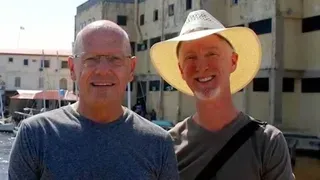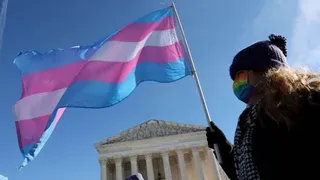November 3, 2010
Local Forum Explores Links From Holocaust To Today
Kevin Mark Kline READ TIME: 3 MIN.
A discussion at the Center on Halsted Oct. 26 focused on the Nazis' persecution and treatment of gays and today's struggle against discrimination.
"The focus of my work is always what lessons can we draw today," said Danny Cohen, who teaches courses on the Holocaust as a professor at Northwestern University.
The discussion, titled "From Pink Triangles to Prop 8: The Holocaust and Gay Rights Today," was sponsored by the Center, Equality Illinois and the Holocaust Remembrance Committee of the Illinois Holocaust Museum and Education Center in Skokie.
Cohen took attendees through a brief history of the experiences of gays living in Berlin before and after the Nazis came to power. The city had an open and thriving gay scene in the late 1920s, he said, and advocates such as Magnus Hirschfeld were close to getting laws against homosexuality, rarely enforced anyway, overturned.
"People referred to Berlin as Gay Berlin," Cohen said. "1933, Hitler comes to power and within just weeks gay and lesbian meeting places and bars were all shut down. Hirschfeld's Institute was shut down and ransacked."
Soon after that the Nazis began incarcerating gays "to be reeducated," Cohen said, with some 100,000 eventually jailed. As many as 10,000 died in the concentration camps and prisons. The death rate for gays who were sent to concentration camps is estimated to have been as high as 60 percent.
But for gays, the persecution didn't end when the Allies defeated the Nazis and liberated the camps and jails. Cohen said British and American lawyers for the Allies advocated keeping gays incarcerated and Germany kept Paragraph 175, the law used by the Nazis to criminalize gays, on the books until 1969. Bias against gays, Cohen said, in the years after World War II, kept many gay Holocaust survivors from telling their stories. It also meant that gays weren't often included in histories, exhibits and remembrances of the Holocaust.
"The historical documentation excluded this group," Cohen said. "It wasn't just the Nazis' actions but also how homophobia had permeated the entire world."
Cohen said he was motivated to focus his Holocaust research on gays in 2005 when Polish officials excluded gays from participation or being recognized in ceremonies commemorating the infamous Nazi concentration camp at Auschwitz-Birkenau.
"This really surprised me and caused me to shift the focus of my work," Cohen said. "Why is it that the non-Jewish victims of the Holocaust are rarely mentioned?"
Equality Illinois CEO Bernard Cherkasov followed Cohen with a discussion of what has and hasn't changed about LGBT equality and discrimination since the Holocaust.
"The world has changed," he said. "But in 80 countries today homosexuality is still criminalized. ...That is still happening today."
Great progress has been made in many countries, Cherkasov said, citing anti-discrimination laws in countries such as Mexico and South Africa. But in other countries, he added, the climate is often dangerous for LGBTs.
"In Russia the situation for lesbian and gay people is bordering on violent," Cherkasov said.
In the United States, there is a long ways to go, he said, but the pace of change is quickening.
"Twelve months ago President Obama signed the hate crimes act," Cherkasov said. "But the Defense of Marriage Act still remains on the books. ...At the same time two courts have ruled parts of DOMA unconstitutional."
And while it is not moving as fast as many want, repeal of the military's ban on openly gay and lesbian servicemembers is moving forward.
"It is a long and confusing battle,' Cherkasov said. "But now eight out of 10 Americans believes Don't Ask Don't Tell is not a good law and should be repealed."
Rick Hirschaut, executive director of the Illinois Holocaust Museum and Education Center, also talked briefly in introductory remarks about the museum.
"It's actually a quite uplifting experience," Hirschaut said. "It actually ends up being a lot different than what's expected."
The museum's exhibits include references to gays and other minority groups targeted by the Nazis.
The Illinois Holocaust Museum and Education Center is located at 9603 Woods Drive in Skokie. It is accessible by car from the nearby Edens Expressway and via Pace Bus Route 208, which runs from the CTA Purple Line stop at Davis in Evanston. For more information go to ilholocaustmuseum.org or call 847-967-4800.







